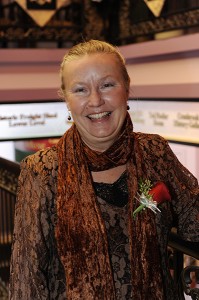Home »

City continues shaping sign bylaw revamp
The City of Cranbrook continues to revamp its signage bylaw with an eye on improving aesthetics while trying to balance the needs of the business community.
City council met for three hours May 15 to go through a draft of the Sign Bylaw with Director of Corporate Services Roy Hales and senior community planner Rob Veg. The city hall meeting room was packed with Cranbrook and District Chamber of Commerce members.
The purpose of the meeting was to allow council a chance to hear about suggested changes or deletions from the draft bylaw, and to comment on them and make directions to city administrative staff.
 The city launched the arduous and often-difficult sign bylaw amendment process in 2012, citing a long overdue need to do so, as the original bylaw was placed on the books in 1977.
The city launched the arduous and often-difficult sign bylaw amendment process in 2012, citing a long overdue need to do so, as the original bylaw was placed on the books in 1977.
A first draft was completed in November 2012, with an open house following on Dec. 5, which launched a public comment period that closed in February.
Responding to the draft bylaw, the Chamber of Commerce rapidly formed the Sign Bylaw Ad Hoc Committee, which presented a detailed report on the proposed changes, with a series of recommendations to council. Many of the recommendations were considered May 15, as well as recommendations made by the Downtown Business Association and the Ministry of Transportation and Infrastructure (MOTI).
Administrative staff sought direction from council on five key areas: billboards, off-premise signs; temporary portable signs; electronic signs; and freestanding signs.
“The primary objectives for a new sign bylaw are to balance three important aspects on which signage can have an effect. The general objectives are: business identification, aesthetics and safety. Through the comments received it is evident that all persons or organizations who submitted comments have different interpretations on how each of the objectives should be addressed or balanced through sign regulation,” states the Corporate Services report to council.
Council methodically worked through the 36-page draft report, with Veg providing background and details on proposed changes.

“It’s been a very large task” taking on the challenge of updating the city’s sign bylaw, said Mayor Wayne Stetski. As the three-hour meeting progressed and council wrestled with aspects of the five key areas, the scale of that task became readily apparent.
The process toward approving a new sign bylaw remains several months in the hopper, council members pointed out.
“This has been a long time coming,” noted Coun. Angus Davis, adding, “There is still plenty of time to have extra input.”
An example of the divergent views of the community when it comes to signage, and what is and isn’t appropriate, was boiled down by council in its discussion about electronic signs, running from the length of time an electronic message should be presented to whether animation should be allowed to what is distracting to some may not be distracting to others.
“I’d like to see more flexibility in this,” said Coun. Diana J Scott.
Coun. Gerry Warner challenged fellow councilors by asking, “What’s distracting? It’s in the eye of the beholder.” He then shared a story of a friend who almost got into an accident on the Highway 3 strip while trying to read City Hero banners.

Coun. Sharon Cross said she is worried about safety when it comes to electronic signs or free-standing signage with animation, such as the Culligan ‘Running Man,’ which she said she finds distracting. Cross said MOTI has stated concerns about such signage and she agrees, noting the city will have to comply with whatever council decided, as it has the largest electronic sign in town (at Western Financial Place).
Davis countered by suggesting distracting signage isn’t as big a deal as some people make it out to be. Noting electronic device addiction among many in society, he said, “We’re distracted 99% of the time.”
Other aspects of the draft bylaw discussed by council were: when/where engineering experts are required concerning sign installation; permitting/costs; off-premise/third party signage; allowable heights; landscaping around signage; temporary/portable signs; sundry definitions; balloon signs; billboards; fines; and a general discussion about why signage legislation needs to be updated.
Stetski said the underlying principle to the bylaw update is to continue to try and beautify Cranbrook and council must remember that.
He told the packed chamber he Googled Cranbrook concerning its asthetics and found 14 articles, from 2000 to 2010 that paint a picture of Cranbrook “not being the prettiest place to be.”
The proposed legislative changes make the document “a forward-looking bylaw,” he said.

Coun. Denise Pallesen said the city must remember that its signage must work for the business community, which must also strive to work together with the city to ensure continued beautification, especially of the highway strip.
“We’re not a Fernie; we’re not an Invermere,” she said, stating the city is a regional business centre.
Coun. Cross argued that the city must blend business concerns with those of its residents.
“To say all we are is an economic generator is not true. People want this city to be a place to come and work and live and play,” she said, warning Crabrook could lose a lot of potential residents if city beauty is not a focus.
“How do we make Cranbrook more than a stop, grab and go?” She asked.

Coun. Davis said he takes exception to people saying Cranbrook isn’t attractive.
“The community has done a lot in making it more appealing to the eye,” he said, pointing out the work Jenny Humphries and Communities in Bloom has done as an example.
“I could go on Google and find anything you want,” he said.
“We have come a long ways; the question is, what more can we do?” Stetski pushed.
Pallesen said she didn’t want to infer that Cranbrook is only an economic engine.
“I didn’t mean that Cranbrook is not beautiful and doesn’t offer much more,” she said.
Council’s billboard signage discussion also illuminated the complexity of legislating something that is essentially ruled by each individual’s tastes and perceptions as to what is visually acceptable.
Stetski suggested banning billboards would go a long way to improving city aesthetics, noting that Fernie and Sparwood have banned them. He also pointed out that some of the billboards in town are “in a serious state of disrepair.”
Cross agreed with the Mayor, saying, “I’d like to see them abolished. They interfere with our mountain landscape.”
Veg suggested to council that provisions added to the city’s sign bylaw in 2005, effectively banning additional billboard signage, may be the cause for some billboards being in poor condition. The bylaw notes that if a sign is structurally damaged and needs repairs, it must be removed, having lost its legal non-conforming status.

Coun. Scott said Veg’s assessment was likely correct and she disagreed with Cross.
“I see the mountains just fine. They don’t impede my view,” she said.
Pallesen, pointing out she is “not keen on them,” said she understands that some people don’t like billboards but they are signs that can be beautiful.
Warner said it depends where a billboard is located “A blanket policy saying no billboards is going too far,” he suggested. “Is there no discretion left in city government?”

Warner said the city could strike a billboard committee that would deal with each application and approvals would be granted based on individual merit. “Let it be discretionary.”
Hales countered by noting that legislation cannot be “subjective” because it opens the door to too many challenges.
Davis said some public comments directed toward the business community “are insulting. They create the wealth” in the town, he noted, adding, “We want an open Cranbrook.”
At that, the Mayor initiated a straw vote on billboards, with Cross and Bob Whetham siding with him on banning billboards, with Davis, Pallesen, Scott and Warner voting against banning them.
Council will return to discussion of the sign bylaw after city staff complete revisions to the draft and present the bylaw for first reading, likely on June 24, said chief administrative officer Wayne Staudt.
“We might just bring back another draft on the 24th” and if any council members are away, it will result in a deferral.
“We do want to put closure on it,” he said, reminding council and the public gallery that no bylaw is written in stone.
“It’s a working bylaw” and can be changed. “Twenty-five years is too long for any bylaw to be left on the books,” he said.
To see the city’s draft sign bylaw go to (please bear in mind this draft does not contain the changes recommended by council May 15): https://cranbrook.civicweb.net/Documents/DocumentList.aspx?ID=3019
See city administrative report at: https://cranbrook.civicweb.net/Documents/DocumentList.aspx?ID=3017
Ian Cobb/e-KNOW







